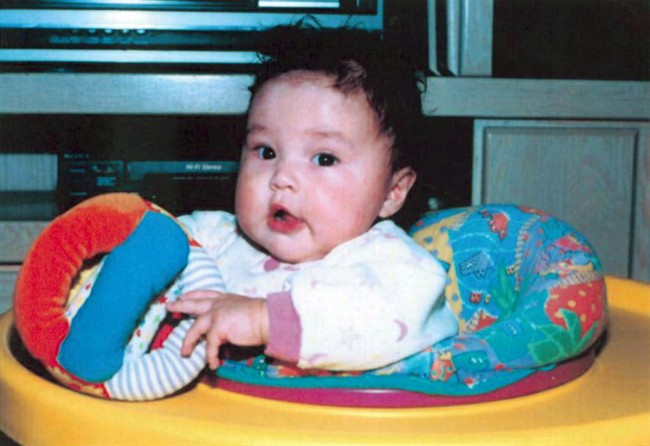WINNIPEG – Manitoba aboriginal leaders say the death of a five-year-old girl at the hands of her guardians was the result of centuries of colonialism in Canada.

Jay Funke, lawyer representing the Assembly of Manitoba Chiefs and the Southern Chiefs Organization, told an inquiry looking into the death of Phoenix Sinclair that the child-welfare practice of seizing native children is seen by many aboriginals as an extension of the residential school system.
“First Nation leaders maintain that these separation practices have also contributed to the grim socio-economic reality confronting many First Nation families and children throughout Manitoba,” Funke told Commissioner Ted Hughes during closing submissions Wednesday.
“This reality includes deep and protracted poverty, disproportionate rates of incarceration and criminal lifestyles, substance abuse, mental health challenges, infant and early mortality and — all too frequently — tragic deaths.”
First Nations make up just under 15 per cent of the Manitoba population, but 85 per cent of the 9,700 children in care are aboriginal.
The impact of colonial practices continues to be felt by native people and helps explain the disproportionate number of aboriginal children in care, Funke said.
“First Nation leaders believe that the tragedy suffered by Phoenix was, in large part, the result of centuries of colonial-based policies and practices which have been forced upon the First Nations people of Canada,” he said.
Phoenix spent much of her short life bouncing in and out of care, but was always returned to her mother, despite allegations of abuse.
The girl died in 2005 on the cold basement floor of her family’s home on the Fisher River reserve after withstanding repeated tortuous abuse which broke virtually every bone in her body.
- Toronto’s construction season traffic is ‘unacceptable.’ Is there a better way?
- More foreign interference action coming after inquiry report, India arrests: LeBlanc
- Nijjar arrests: Indian foreign minister says Canada welcomes ‘criminals’
- B.C. man losing vision needs to find home for treasured book collection
She was buried in a shallow grave near the community’s garbage dump while her mother, Samantha Kematch, continued to collect child subsidy cheques.
Kematch and her boyfriend, Karl McKay, were convicted of first-degree murder.
Hughes is examining how Phoenix slipped through the cracks of Manitoba child welfare and why her murder went undiscovered for months.
After hearing testimony from 126 witnesses, Hughes is hearing closing submissions this week. His report is expected by mid-December.
The province and some child-welfare authorities say the system has greatly improved since Phoenix’s death, but Funke said the inquiry must also address the disproportionate number of aboriginal children in care.
Children are most often apprehended because of neglect. Funke said there is no clear definition of what constitutes neglect. Systemic poverty and lack of adequate housing may be beyond the control of parents and shouldn’t necessarily be cause for children to be removed from the home, he said.
Apprehending children is expensive and can do more harm to the child, Funke said.
“First Nation leaders are concerned about the fragmentation of traditional family units and the loss of community practices that traditionally saw First Nations flourish and live a good and healthy life.”
The way child welfare is funded needs to be examined as well to see if there is a “built-in incentive” to remove children from their home, Funke added.
Often, he said, funding is only available after a child is apprehended instead of supporting the family while the child remains in the home.
First Nations leaders want to see that the inquiry and the recommendations arising from it have honoured the life of Phoenix and contributed to improvements, the lawyer concluded.
“The First Nations leaders of this province are committed to ensuring that Phoenix did not die in vain.”



Comments